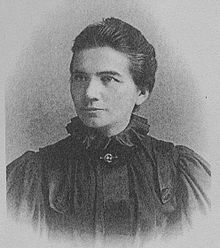Bertha Kipfmüller
She was, in addition, a committed pacifist during a period remembered for intensifying nationalist-populism in Europe, a linguistic genius and a passionate believer in life-long learning.
In order to prepare for the exam she was obliged to depend on private tutoring since the relevant government "preparatory school" only provided places to candidates who were boys.
[2] Between 1879 and 1896 Kipfmüller worked as a teacher at junior schools at, successively, Eysölden (Thalmässing), Heilsbronn Abbey (Ansbach) and, from 1886, Schoppershof, a little town just outside Nuremberg (into which it has subsequently been subsumed).
[6] In 1890 she was a co-founder of the "German Women Teachers' Association" ("Allgemeiner Deutscher Lehrerinnenverein"), a Pan-German coming together of a number of regional organisations with similar objectives.
Sewing and handcraft courses were also organised in order to provide women with improved opportunities for earning a living, and the association backed up its initiatives by establishing an appropriately stocked library.
[10] Her rejection of the widespread view that women were not suited to further education, combined with her own private study which at the time was focused on Kantian philosophy, languages and linguistics, drove Kipfmüller to the conviction that she needed to obtain a degree in Philology.
[12] Kipfmüller used the opportunities arising at Heidelberg to embark on a broad range of university-level studies that embraced Germanistics, Sanskrit, Comparative philology, Philosophy, History and "Nationalökonomie" (very loosely, "Applied economics").
Her dissertation, subsequently published in book form with a dedication to the memory of her father, concerned the light-hearted stage works of the eighteenth-century theatrical polymath August Wilhelm Iffland.
[11] A more progressive process, starting in 1898, was the creation through amalgamations of the Bavarian Association of Men and Women Teachers ("Bayerischer Lehrer- und Lehrerinnenverband"), of which Kipfmüller can also be seen as a co-founder.
She also chaired the Nuremberg branch of the "Verein für das Deutschtum im Ausland" (VDA - as the "Association for German cultural relations abroad" was known before 1933.
It was entitled "Die Frau im Rechte der Freien Reichsstadt Nürnberg" (loosely, "The legal position of women in Nuremberg [since 1564]").
Harnack House was home to the Kaiser Wilhelm [scientific] Society, but on this occasion its attraction to Kipfmüller was its proximity to Berlin University, where she was able to improve her Mandarin while studying Sinology more broadly.
[2] As the war drew to its close she became convinced that the whole of Germany was likely to be occupied for the foreseeable future by Soviet troops and started learning Russian.
[9] While she was working at Eysölden, Bertha Kipfmüller met a young army officer who was still recovering from physical and psychological wounds inflicted by participation in the Franco-Prussian War.
The social conventions of the time restricted the extent of the ensuing romance, and Bertha's father could not afford the financial contribution that would have facilitated marriage.
[3][17] Deeply traumatised by the tragic ending of what at least one commentator sees as the great love of her life, Kipfmüller resolved to stay single, and commit her apparently undiminished reserves of energy to her work, her study and her campaigning.
